We've all had nights out we'd just as soon forget. A few (too many) drinks in, we've all said things or done things that could sure benefit from a bit of liberal save-scumming... But however regrettable our outings may have been, I very much doubt anybody – and I mean anybody – ever had one as bad as the Grey Warden in Dragon Age: Origins. Poor sod had one drink – just the one! – and not only got saddled with psychic nightmares and eerie voices, but was also condemned to a brief life of struggle and untimely death against a rampaging, monstrous horde. Bummer.
Thankfully for us, though, the Warden's grim fate made for one of the best RPGs ever.
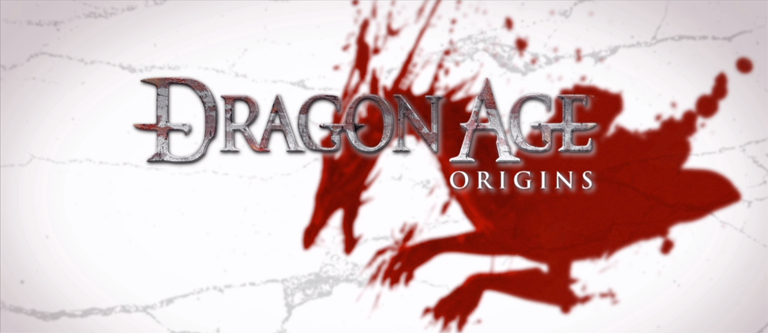
Developed quietly, over the course of seven years by BioWare Edmonton, Dragon Age: Origins was meant to start a new gaming franchise and, at the same time, go back to what BioWare felt it did best: craft a story-rich RPG (this time set in an original world so that, unlike Baldur's Gate – with it's D&D dependency – it wouldn't have any pesky strings attached for future iterations).
A 3rd-person, stat-driven, story-rich RPG, structurally, the game contains all of the BioWare staples. The world (Ferelden) is confronted by a great evil (Darkspawn), who can only be opposed by a Faction That's Seen Better Days (Grey Wardens) who pick you (The Warden, or – later – Warden Commander) to oppose it. You Put The Band Back Together (this time from a cast of 10 truly unique characters), unite the embittered factions of Ferelden and (just maybe) put a stop to the "evil" threatening the world... And while, on paper, DA:O may sound like a stand-in for KOTOR, Jade Empire or Mass Effect, in practice it's probably the most accomplished story BioWare ever put together.
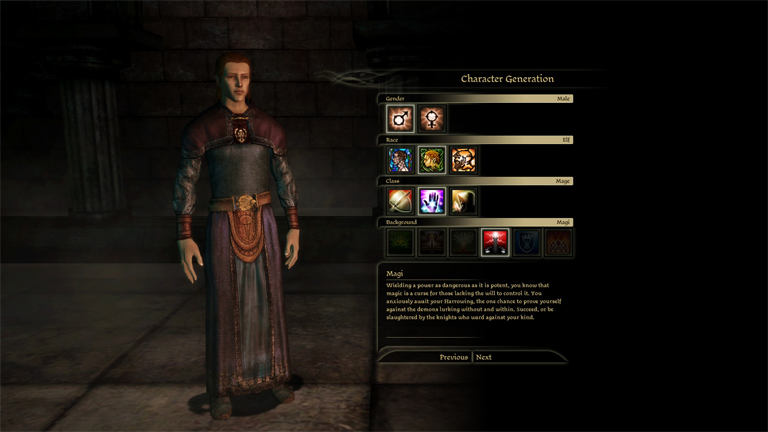
The difference starts at the name: the titular origins are not – in fact – just an allusion to the beginning of a new franchise, or a reset back to BioWare's roots, but actual, disparate beginnings of any freshly-minted character. Six in total (but effectively up to three per race), the origins flesh-out your backstory while also slightly changing the flow of any given playthrough.
Humans can come from noble stock or the mages' circle; elves can be dalish (wild), city or also dabble in magic; and dwarves have the option of being commoner or prince(ss). Each origin comes with its own, distinct prologue which then affects different parts of the campaign proper. Play a thieving dwarf who got herself into trouble and, somewhere along the line, you will run into characters from your past and be given a chance to cinch the plot-line. It's a neat approach that has tangible effects on each playthrough and has since been co-opted (albeit to a lesser extent) by the likes of Cyberpunk 2077.
The core elements of the game break down into branching dialogue (over 68 thousand spoken lines' worth), exploration (with a world-map and random encounters), Morally Ambiguous Decisions (more on that later), inventory management, some light crafting and gory, unforgiving, tactical combat.
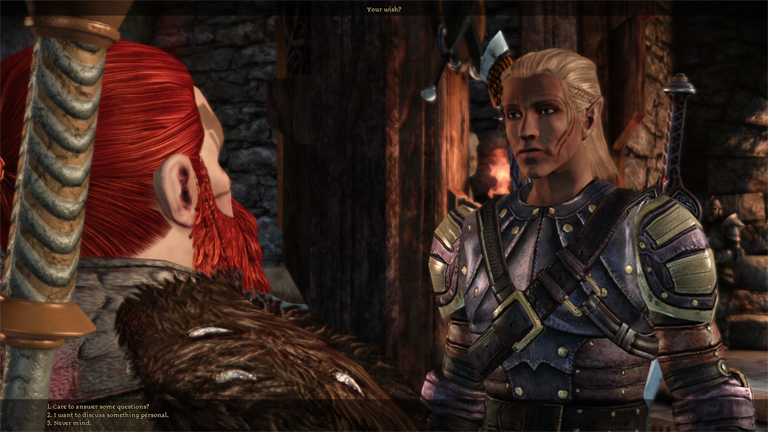
All of the voice-overs are of a consistently high quality, with some memorable lines and actors who did a fantastic job getting under the skin of their respective roles. From blunt but manipulative Morrigan, to the glorious, ongoing train-wreck that is Oghren, most of the leading NPCs have equivalents in the casts of previous BioWare games, but are infinitely more refined. They have their own mindsets, outlooks and motivations and will not hesistate to disagree with the player if they choose to ignore or go against them. Getting along with an NPC (much like in real-life interactions) requires an understanding of what makes them tick. And while some of the relationships are more fleshed-out than others, no single character feels half-baked or phoned-in.
The banter between your companions is a bit hit-and-miss, but sometimes hilarious and a neat counterpoint to the consistently grim outlook of the game's setting.
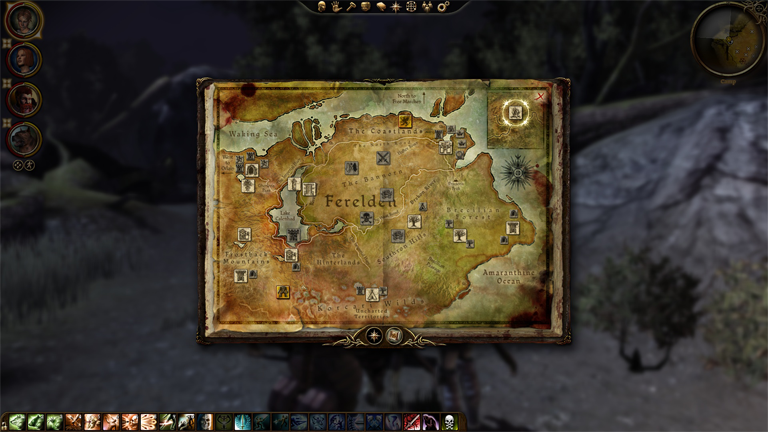
Speaking of which, Ferelden ain't huge. The world map is on par with Baldur's Gate II for places to visit, offering one hub (Denerim) and about 18 quest-related locations of varying size and complexity. That the game's Eclipse graphics engine was made hot on the heels of the aging one from Neverwinter Nights shows, so don't expect a great deal of detail or variation in your surroundings. The color scheme is almost Fallout 3-drab and recycled assets run rampant.
Also, like NWN 2, Origins has a tendency to re-use one map with multiple points of entry for many scenes, which waters down the uniqueness of random encounters. The levels for the main quests, though, are all artfully designed with some truly breathtaking scenery.
While morality pervades the entire game, unlike other BioWare titles, it has no handy, on-screen metric to tell you if You Done Good. Rather, the game pitches some harsh decisions your way, which do not have clear-cut solutions, and leaves it up to you to decide if you can live with the outcome of your actions. It's a bit more harrowing than the paragon/renegade meter in Mass Effect, or light/dark side points in KOTOR, but feels more true to life and less like an Obvious Game Gimmick.
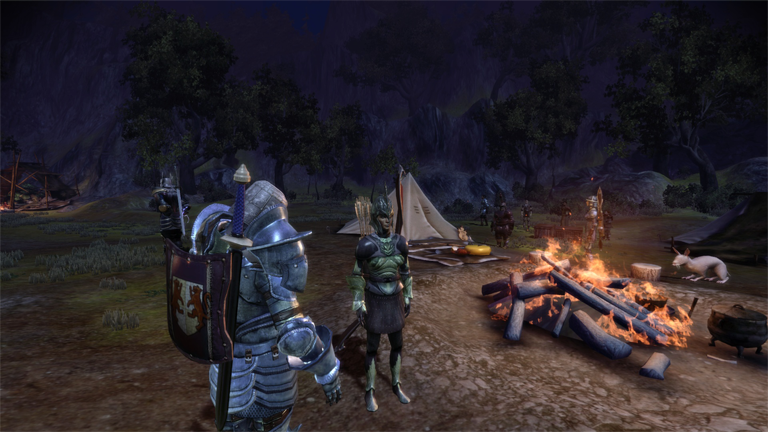
And – make no mistake – the decisions in Origins are tough. My favorite example takes place in Orzammar, the dwarven capitol, at the tail end of its plot line. You have to decide which of two candidates will be crowned king. One is a benevolent ruler respectful of tradition, while the other could best be described as a lifelong fan of Il Principe who took the lessons a bit too much to heart. So – easy, right? Back the wise, old gray-beard. Job done.
Except doing the obvious thing changes nothing in troubled, dwarven society. Oh, you still finish your quest and the lunatic prince is kept away from power, but the divisions that have fractured and undermined dwarven society for centuries stay in place for the (definite) worst... So, okay, you back the paranoid, fratricidal, visionary upstart psycho — and the first thing he does is have his rival executed... But dwarven society flourishes as a result.
Nothing's ever cut and dry in Origins and quests (especially the main ones) frequently straddle the middle-way, gray areas, giving you results you want at prices you may not wish to pay.
An RPG without combat is— Well, Disco Elysium, actually, but — you get my drift. Combat and adventure usually go hand in hand and Origins does not disappoint on that front. Like Baldur's Gate before it, combat is party-based and tactical with several things for the player to consider.
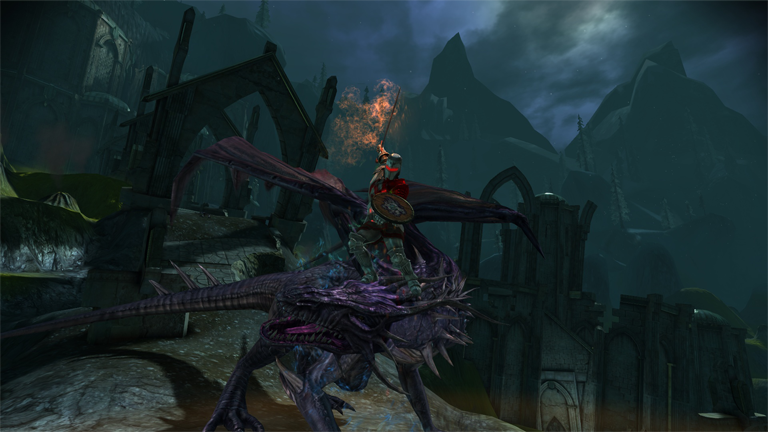
On top of a basic attack, every class in DA:O gets special abilities which range from devastating attacks, to debilitating spells, defense boosts, healing and everything in between. But abilities use up stamina, while spells deplete the mana of your mage. To have any hope of navigating the pretty-tough battles in Origins (especially the bosses), the player has to maintain a balance between having a high enough defense not to take too much damage and keeping a big enough reserve of stamina/mana so as not to limit your actions during a melee.
While rogues, warriors and archers are limited to armor, weapon and abilities, spell effects can be combined for a variety of inventive combos. And though some, like Grease Fire, are fairly straightforward (the hint is in the name), others (like Nightmare, Storm of the Century or – my favorite – Shockwave) take a bit of figuring to invoke and use effectively. A well-executed spell combo can quickly tip the scales in your favor; a poorly-executed one is often a guarantee you will shortly be replaying the very same battle.
The game comes stock with a pause, so you can issue orders in peace (or at least temporarily postponed panic) and fairly exhaustive, customizable NPC behaviors that smack of Actual Programming, but offer unparalelled control over how your companions behave. If you enjoy micro-managing the finer aspects of NPC behavior under practically any circumstances, Origins has got you covered.
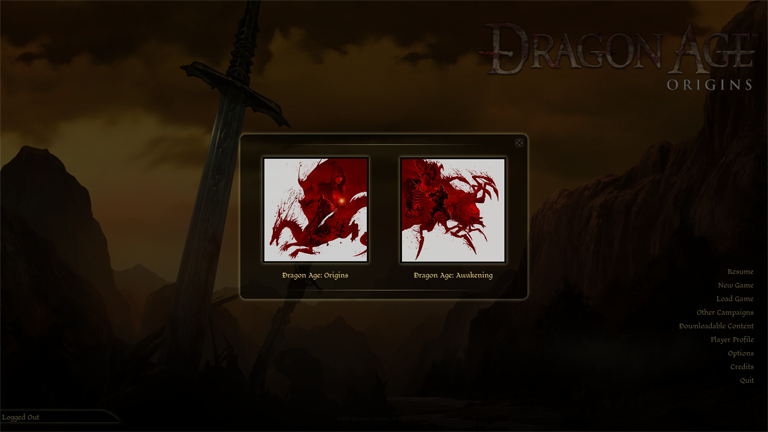
In terms of length, the main campaign can easily take 40-80 hours (depending on how thoroughly you play it) and the decidedly-neat Awakening expansion (which continues the main plot and allows you to import your character from the original) tacks on another 20 or so. There are other modules available, but none of them are as enjoyable or worthwhile.
Leliana's Song, Darkspawn Chronicles and Golems of Amgarrak unlock items for the main game on completion, but are a bit boring, if I'm honest (especially Golems, which feels recycled, cheap and with an unnecessary focus on difficult battles, rather than story or dialogue). Witch Hunt does offer some closure to the main plot, but – without any characters from Origins or Awakening – feels like a tacked-on afterthought. The best gameplay is in the core game and the Awakening expansion. The other modules, I'd recommend only to Completionists of a Tolerable and Patient Disposition.
Although the Dragon Age franchise has gone on to spawn three more games (so far), the experience of successive titles has never been able to recapture the amount of work, care and charm of the original (and – no – I don't care how many awards Inquisition's racked up). Sure, the game world may be a little grim and the color palette a bit limited, but — if you are in the market for a Grand Adventure (of up to 100 hours) in a beautifully crafted world with NPCs worth knowing — even 14 years later, Dragon Age: Origins remains eminently worthy of your time...
So — what are you waiting for? Go on. Chug that goblet...
I mean, how much harm can one drink do?
